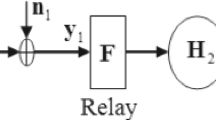Abstract
Based on imperfect channel state information (CSI) and relay selection, a cross-layer optimization scheme is developed for cooperative MIMO system, and the corresponding system performance is investigated in Rayleigh fading channel. By the theoretical analysis and mathematical manipulation, the average spectral efficiency (SE), packet error rate (PER) and packet loss rate (PLR) are derived. As a result, closed-form expressions of the average SE, PER and PLR are obtained, respectively. According to these, a cross-layer design (CLD) scheme subject to the average PER constraints is proposed to avoid the SE performance loss caused by the conventional instantaneous PER constraints. The scheme optimizes the adaptive thresholds by maximizing the average SE of the system, and an iteration method joint the Lagrange multiplier and Newton methods is presented to solve the above optimization problem. Simulation results verify the validity of the theoretical analysis. The results show that the proposed CLD scheme can improve the SE while target PLR is maintained. The CLD scheme under average PER constraints has higher SE than the conventional CLD scheme under instantaneous PER constraints.
Similar content being viewed by others
References
Cohen R, Grebla G, Katzir L. Cross-layer hybrid FEC/ARQ reliable multicast with adaptive modulation and coding in broadband wireless networks. IEEE/ACM Trans Netw, 2010, 18: 1908–1920
Ramis J, Femenias G. Cross-layer design of adaptive multirate wireless networks using truncated HARQ. IEEE Trans Veh Technol, 2011, 60: 944–954
Liu Q W, Zhou S, Giannakis G B. Cross-layer combining of adaptive modulation and coding with truncated ARQ over wireless links. IEEE Trans Wirel Commun, 2004, 3: 1746–1755
Lu X F, Zhu G X, Liu G, et al. A cross-layer design over MIMO rayleigh fading channels. In: Proceedings of IEEE International Conference on Wireless Communications, Networking and Mobile Computing (WiCOM’ 2005), 2005. 50–53
Zhu X, Yuan D. Cross-layer design for MIMO correlated Nakagami fading channels. In: Proceedings of IEEE Proceedings of the International Workshop on Cross Layer Design, 2007. 50–54
Yu X, Shi H. Performance analysis of variable-power adaptive modulation in space-time block coded MIMO diversity systems. Sci China Inf Sci, 2010, 53: 2106–2215
Laneman J N, Tse D N C, Wornell G W. Cooperative diversity in wireless networks: efficient protocols and outage behavior. IEEE Trans Inf Theory, 2004, 50: 3062–3080
Dai L, Letaief K B. Cross-Layer design for combining cooperative diversity with truncated ARQ in ad-hoc wireless networks. In: Proceedings of IEEE Global Telecommunications Conference, 2005. 3175–3179
Zhu Y, Li Y, Duan Z, et al. Joint relay selection and ARQ in cooperative diversity wireless networks. In: Proceedings of 4th International Conference on Wireless Communications, Networking and Mobile Computing, 2008. 1–3
Tseng C K, Wu S H. Simple cooperative ARQ protocols with selective amplify-and-forward relaying. In: Proceeings of IEEE 20th International Symposium on Personal, Indoor and Mobile Radio Communications, 2009. 325–329
Torabi M, Haccoun D. Capacity analysis of opportunistic relaying in cooperative systems with outdated channel Information. IEEE Commun Lett, 2010, 14: 1137–1139
Torabi M, Haccoun D. Capacity of amplify-and-forward selective relaying with adaptive transmission under outdated channel Information. IEEE Trans Veh Technol, 2011, 60: 2416–2422
Choi B, Hanzo L. Optimum mode-switching-assisted constant power single-and multicarrier adaptive modulation. IEEE Trans Veh Technol, 2003, 52: 536–559
Nechiporenko T, Kalansuriya P, Tellambura C. Performance of optimum switching adaptive M-QAM for amplify-and-forward relays. IEEE Trans Veh Technol, 2009, 58: 2258–2268
Laneman J N, Wornell G W. Energy efficient antenna sharing and relaying for wireless networks. In: Proceedings of IEEE Wireless Communication and Networking Conference, 2000. 7–12
Anghel P A, Kaveh M. Exact symbol error probability of a cooperative network in a Rayleigh-fading environment. IEEE Trans Wirel Commun, 2004, 3: 1416–1421
Torabi M, Ajib W, Haccoun D. Performance analysis of amplify-and-forward cooperative networks with relay selection over Rayleigh fading channels. In: Proceedings of IEEE Vehicular Technology Conference, 2009. 1–5
Yang H C, Alouini M S. Order Statistics in Wireless Communications: Diversity, Adaptation, and Scheduling in MIMO and OFDM Systems. New York: Cambridge University Press, 2011
Alouini M S, Goldsmith A J. Adaptive modulation over Nakagami fading channels. Wirel Person Commun, 2000, 13: 119–143
Yu X, Leung S H, Kuang Q, et al. Performance analysis of variable-power adaptive modulation with outdated feedback for space-time coded MIMO systems. IEEE Trans Veh Technol, 2012, 61: 2613–2624
Proakis J G. Digital Communications. 5th ed. New York: McGraw-Hill, 2007
Gradshteyn I S, Ryzhik I M. Table of Integrals, Series, and Products. 7th ed. San Diego: Academic, 2007
Liu C. Numerical Analysis Teaching. Xi’an: Northwestern Polytechnical University Press, 2005
Liu J, Yuan J P. A kind of chaos algorithm for solving nonlinear equation group (in Chinese). J Harbin Univ Commer (Nat Sci Ed), 2001, 17: 31–34
Hua J, Meng L, Xu Z, et al. An adaptive signal-to-noise ratio estimator in mobile communication channels. Dig Signal Process, 2010, 30: 692–698
Hua J, Meng L, Xu X, et al. Novel scheme for joint estimation of SNR, Doppler, and carrier frequency offset in double-selective wireless channels. IEEE Trans Veh Technol, 2009, 58: 1204–1217
Hua J, Xu Z, Li J, et al. Doppler shift estimator with MMSE parameter optimization for very low SNR environment in wireless communications. IEEE Trans Aerosp Electron Syst, 2008, 44: 1228–1233
Shu F, Zhao J, You X, et al. An efficient sparse channel estimator combining time-domain LS and iterative shrinkage for OFDM systems with IQ-imbalances. Sci China Inf Sci, 2012, 55: 2604–2610
Hua J, Meng L, Li G, et al. Joint estimation of channel parameters for very low signal-to-noise ratio environment in mobile radio propagations. Radio Sci, 2010, 45: RS4010, doi:10.1029/2009RS004273
Hua J, Meng L, Zhao X, et al. A doppler shift estimator in radio propagations. Radio Sci, 2009, 44: RS4005, doi:10.1029/2009RS004159
Author information
Authors and Affiliations
Corresponding author
Rights and permissions
About this article
Cite this article
Yu, X., Zhou, T., Rui, Y. et al. Cross-layer design for cooperative MIMO systems with relay selection and imperfect CSI. Sci. China Inf. Sci. 56, 1–10 (2013). https://doi.org/10.1007/s11432-012-4774-5
Received:
Accepted:
Published:
Issue Date:
DOI: https://doi.org/10.1007/s11432-012-4774-5




